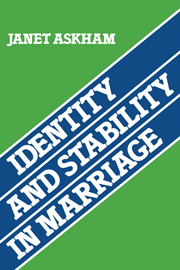Book contents
- Frontmatter
- Contents
- Preface
- 1 Prologue
- 2 Ways of looking at marriage: an introduction to the study
- 3 Knowing and talking to each other
- 4 Separate and joint activity
- 5 Constraints on behaviour within marriage
- 6 Changes in self and in activities
- 7 Relationships outside marriage
- 8 Conclusion
- Appendix 1 Sample selection
- Appendix 2 Interview guide
- Appendix 3 Profiles of the couples
- Glossary
- Bibliography
- Index
- Frontmatter
- Contents
- Preface
- 1 Prologue
- 2 Ways of looking at marriage: an introduction to the study
- 3 Knowing and talking to each other
- 4 Separate and joint activity
- 5 Constraints on behaviour within marriage
- 6 Changes in self and in activities
- 7 Relationships outside marriage
- 8 Conclusion
- Appendix 1 Sample selection
- Appendix 2 Interview guide
- Appendix 3 Profiles of the couples
- Glossary
- Bibliography
- Index
Summary
The balancing act
There are good reasons for concluding that marriage is in many ways a compromise between stability-maintaining and identity-upholding behaviour, and that on the whole married people perform this balancing act very skilfully. For example, they seem to talk to each other a good deal, and often about things they would keep private from outsiders, but they also avoid talking, often because they do not wish to upset or annoy each other. Apart from when they are at work, they spend most of their time together; but they do have occasional separate outings although they seem aware of a need to limit these and to confine them to ‘acceptable’ activities. They are all conscious that their activities are restricted and that they are constrained to adopt certain patterns of behaviour. But while having cause for some regret, almost without exception people accept these constraints; they get used to them, they are not too heavy a burden, and they are the inevitable accompaniments of the satisfactions which marriage also brings. Again this seems to show a middle way: if the constraint were heavier or lighter dislike would outweigh acceptance. For example, if their responsibilities were greater people would feel overburdened by them, but if they were lighter they would miss the enjoyment or sense of achievement which they also bring. Marriage brings several gratifications; the major ones – apart from having someone to share time and talk with – being children, a home of one's own, and feelings of increased maturity and worth.
- Type
- Chapter
- Information
- Identity and Stability in Marriage , pp. 183 - 195Publisher: Cambridge University PressPrint publication year: 1984



